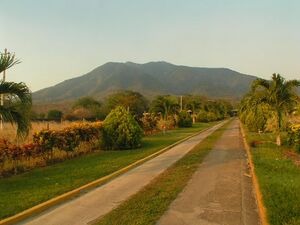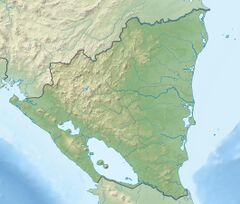Maderas
Topic: Earth
 From HandWiki - Reading time: 2 min
From HandWiki - Reading time: 2 min
| Maderas (volcano) | |
|---|---|
 Maderas, as seen from the south (April 2008) | |
| Highest point | |
| Elevation | 1,394 m (4,573 ft) [1] |
| Coordinates | [ ⚑ ] : 11°26′46″N 85°30′54″W / 11.446°N 85.515°W [1] |
| Geography | |
| Location | Rivas Department, Nicaragua |
| Geology | |
| Mountain type | Stratovolcano |
| Last eruption | Unknown |
With a height of 1,394 metres (4,573 ft), Maderas is the smaller of the two volcanoes which make up the island of Ometepe. The volcano, and the island upon which it sits, is situated in Lake Nicaragua in Nicaragua, Central America. Unlike Concepción,[2] the other volcano on the island, Maderas has not been active in historical times. Its crater contains a crater lake.
The slopes of Maderas are one of the few places on the Pacific side of Nicaragua where cloud forests grow. The only other place where this ecosystem can be found is the Mombacho volcano. Cloud forests are characterized by a rich plant and animal life, made possible by the high levels of humidity in the climate. Prehistoric petroglyphs have been found at the Maderas volcano.
Climbing to the top of the volcano is a popular tourist activity. Tourists are strongly encouraged by local guiding companies to hire a guide, but the trail from the common starting point at Finca Magdalena is easy to see the entire way to the top. The hike to the top of the crater can be difficult, with steep inclines that become muddy during rainy weather. It rains often on Ometepe Island, so a slippery climb is likely, even in the dry season. The round-trip hike takes between 6 and 9 hours and changes from dry forest to humid forest to cloud forest.[3]
There are a number of animal species that dwell on the volcano, including the white-faced monkey, mountain crab, howler monkeys, and a number of butterflies including the blue morphos.[citation needed]
See also
- List of volcanoes in Nicaragua
References

External links
 |
 KSF
KSF
